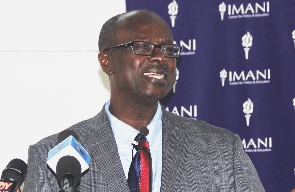Prof Stephen Kwaku Asare, popularly called Kwaku Azar, has advised the Respondents in the ongoing Election Petition at the Supreme Court to move for a “directed verdict” if they feel the Petitioner has failed to meet the burden of production.
He explains in a post on his Facebook timeline that the standard for evaluating such a motion is whether the Petitioner has failed to establish a prima facie case in support of the reliefs that he seeks.
“The Respondents are entitled to move for a directed verdict if, in their view, the Petitioner has failed to meet its burden of production [...] That is, the Petitioner is not required to overwhelmingly prove every element of its case. It is a low burden indeed and such applications are frequently denied,” Prof Asare wrote. “Furthermore, once such a motion is made, the Petitioner has the right to an opportunity to supplement its evidence so as to defeat the motion.”
He indicated that an Article 64 petition is “sui generis” [unique] adding that “the returning officer is not just a necessary and a material party but more important she is the only person who can provide definitive evidence that rebuts the Petitioner’s claims”.
Kwaku Azar further indicated that Jean Mensa, who is the Chairperson for the 1st Respondent and the Returning Officer for the December 7, 2020, presidential election performs a public function and has a responsibility to answer the Petitioner’s questions.
“Such answers are important to all parties and the country as a whole to remove any clouds surrounding the election outcome,” Azar stressed.
“Not only should the Returning Officer want to tell her side of the story, the Court must actually be interested in hearing what she has to say. This is especially so in light of the Court’s rulings denying the Petitioner access to some materials in the Returning Officer’s custody.”
The KPMG Professor in Accounting who is also a Fellow in Public Law and Justice at CDD-Ghana added that it is also his belief that the Petitioner should be able to call the Returning Officer and treat her as a hostile witness if she chooses not to appear to defend her witness statement.
“Furthermore, because the Petitioner has been served with the witness statement, they can tender it into evidence as hearsay evidence and call the witness for cross-examination!” he observed.
“The only reason the Returning Officer should be shielded from the witness box is if the Court concludes that the Petitioner’s case does not meet the prima facie test.”
About Nana Addo Dankwa Akufo-Addo, who is the second Respondent, Kwaku Azar explained that he “is neither a necessary nor a material witness. It is entirely within his right not to enter the witness box.”
After the hearing on Monday, February 8, 2021, the lead counsel for the 1st Respondent as well as lead counsel for the second Respondent both told the Supreme Court that they do not intend to open their defence nor call witnesses.
Citing Order 36 Rule 43 and C.I. 87 Rule 3 (e) 5, lead counsel for the EC, Justin Amenuvor, told the seven-member panel of judges that the EC was satisfied with proceedings so far and asked the court to make a determination on the petition before it.
But Tsatsu Tsikata disagreed.
He averred that the move by the first and second Respondents was a deliberate attempt by the EC Chairperson Jean Mensa to avoid cross-examination which will expose the illegalities that characterised the December 7 elections.
Click to view details



General News of Tuesday, 9 February 2021
Source: www.ghanaweb.com

















